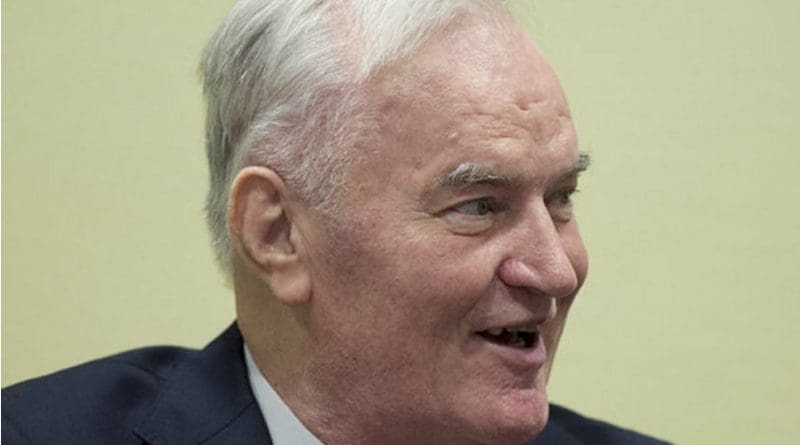Mladic Verdict Highlights Bosnia’s Ethnic Divisions – Analysis
In a sign of continuing post-war divisions, Bosniak survivors of the conflict welcomed Ratko Mladic’s life sentence for genocide and crimes against humanity, but Bosnian Serbs accused the Hague Tribunal of anti-Serb bias.
Starkly opposing reactions from Bosniaks and Serbs to the conviction of former Bosnian Serb military chief Ratko Mladic on Wednesday again highlighted how ethnic divisions remain deeply rooted in Bosnia and Herzegovina, 22 years after the end of the war.
Representatives of war victims’ associations who attended the verdict at the Hague Tribunal cheered when Mladic was sentenced to life imprisonment; some also shed tears.
“It shows that you cannot commit crimes with impunity,” said one of them, Fikret Grabovica from the Association of Parents Whose Children were Killed in Wartime.
Mladic was convicted of the genocide of Bosniaks from Srebrenica in 1995, as well as war crimes and crimes against humanity, although he was acquitted of responsibility for committing genocide in six other Bosnian municipalities in 1992.
The former mayor of Srebrenica, Camil Durakovic, a Bosniak, said he regretted that Mladic was not also found guilty of the 1992 genocide charge.
“I think we can be partially pleased with the life sentence for the person most responsible of commanding the army that committed all those crimes, on the order of politicians, but not with the fact that genocide hasn’t been confirmed in other places,” Durakovic said.
Bakir Izetbegovic, the Bosniak member of Bosnia’s tripartite presidency, told a press conference that he was “certain that the silent majority of Bosnian Serbs do not accept the crimes” committed by Mladic.
“Ratko Mladic is a criminal and a coward because only a coward can imprison civilians, women and children,” Izetbegovic said.
But the reaction in Bosnia’s Serb-dominated entity of Republika Srpska was strongly negative.
The current Serb mayor of Srebrenica, Mladen Grujicic, said that the verdict confirmed that the Hague Tribunal was set up to persecute Serbs.
“Mladic will be remembered in history and this sentence only strengthens his myth among the Serb nation, which is grateful to him for saving it from persecution and extermination,” Grujicic told media.
Republika Srpska’s President Milorad Dodik said that the verdict was an insult and that Mladic will continue to be perceived by the Serb people as someone who saved them from genocide.
“We see this as a slap in the face for Serb victims, of whose suffering no one has been convicted,” Dodik told a press conference.
The Serb member of Bosnia’s tripartite presidency, Mladen Ivanic, also said that the verdict showed that the Hague Tribunal is biased against Serbs.
“When you look at the hundreds of years [in sentences] that Serbs have received, and compare it with the 50 years that the Hague gave for crimes against Serbs, that says enough about this court,” Ivanic told FENA news agency.
However Bosnian Prime Minister Denis Zvizdic insisted that Mladic’s verdict was a judgment on “an individual, not his people”.
Zvizdic said the verdict should be “a message for future generations to move towards peace, cooperation in the region, a common European future and economic prosperity”.
‘No tears’, says Serbian president
The conviction of Mladic also caused mixed reactions in Serbia, angering right-wingers but encouraging rights campaigners.
Senior officials in the country, which is seeking to join the EU, tried to avoid encouraging nationalist passions without endorsing the verdict either.
President Aleksandar Vucic – who was once responsible for putting up a commemorative Ratko Mladic street sign in Belgrade before claiming to have renounced his nationalist politics – said that Serbia should not “choke on tears over the past”.
“My call to people in Serbia today is to start looking to the future,” Vucic told local media.
He also said that “unpunished crimes” against Serbs could not diminish the magnitude of those committed by Serbs.
Prime Minister Ana Brnabic echoed Vucic’s comments about the verdict, saying it did not come as a surprise.
“We need to turn to the future in order to finally have a stable country. We need to leave our past behind,” Brnabic told media during a visit to Norway.
Human rights NGOs saluted the sentence and called on Serbia to face up to its past.
Pacifist NGO Women in Black called on the current government – “whose officials shared the policies that inspired and assisted genocide”, it alleged – to stop denying the Srebrenica genocide.
The Youth Initiative for Human Rights meanwhile urged the Serbian parliament to adopt a declaration on the Srebrenica genocide and express “utmost respect for the victims”.
Meanwhile Serbian right-wing parties slammed the Hague Tribunal’s verdict, claiming that the court had confirmed its ‘anti-Serb’ stance.
“The verdict is political, and it’s mostly directed against the Serbs who took part in the war,” said the leader of the Serbian Radical Party, Vojislav Seselj, who is also a war crimes defendant.
The leader of the right-wing Dveri party, Bosko Obradovic, called Mladic a “war hero” and said that the sentence was a “scandal”.
Dveri called on Serbs to demonstrate in central Belgrade on Wednesday evening, but only a few dozen protesters turned up to show support for the former Bosnian Serb military chief.

